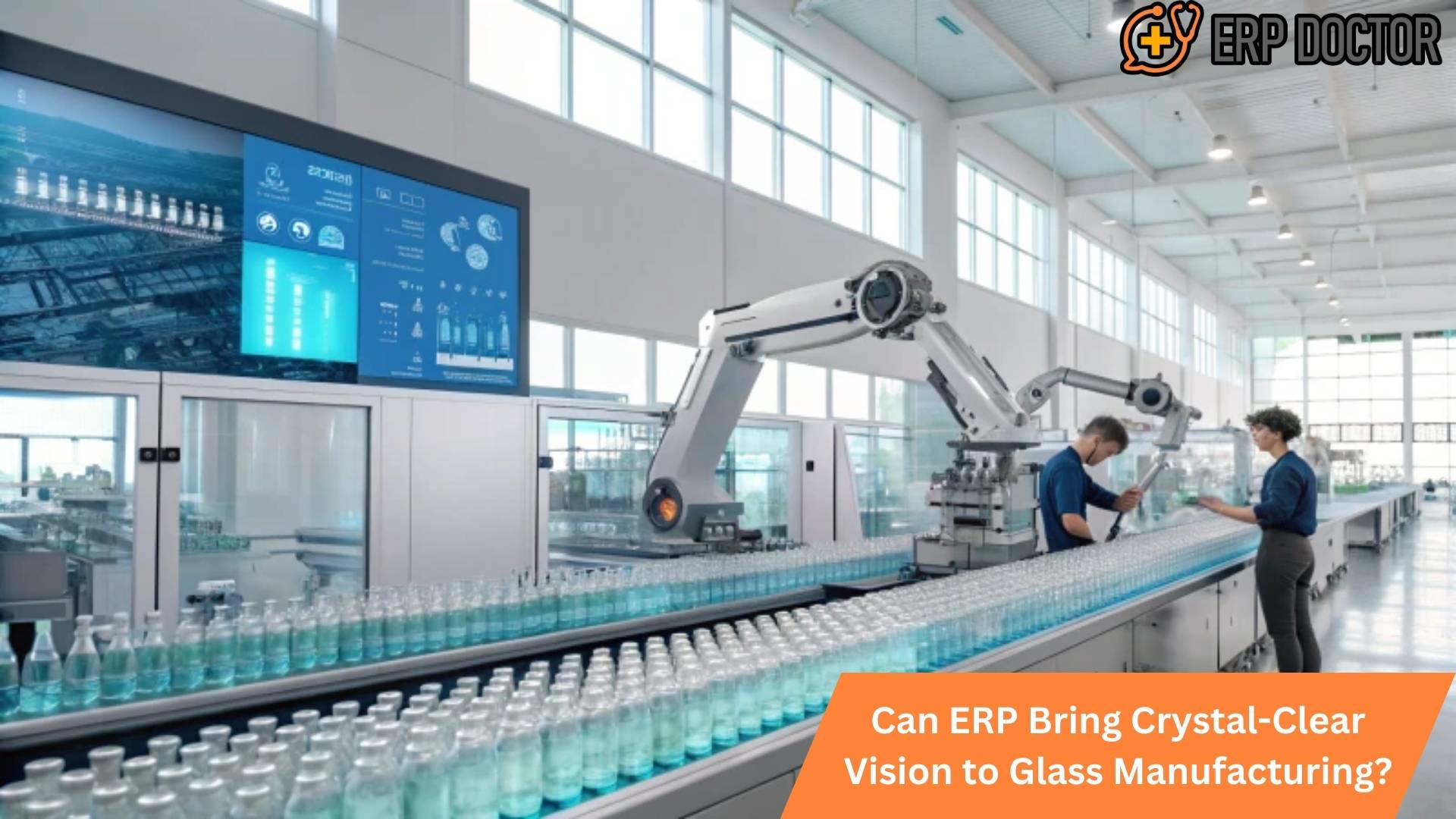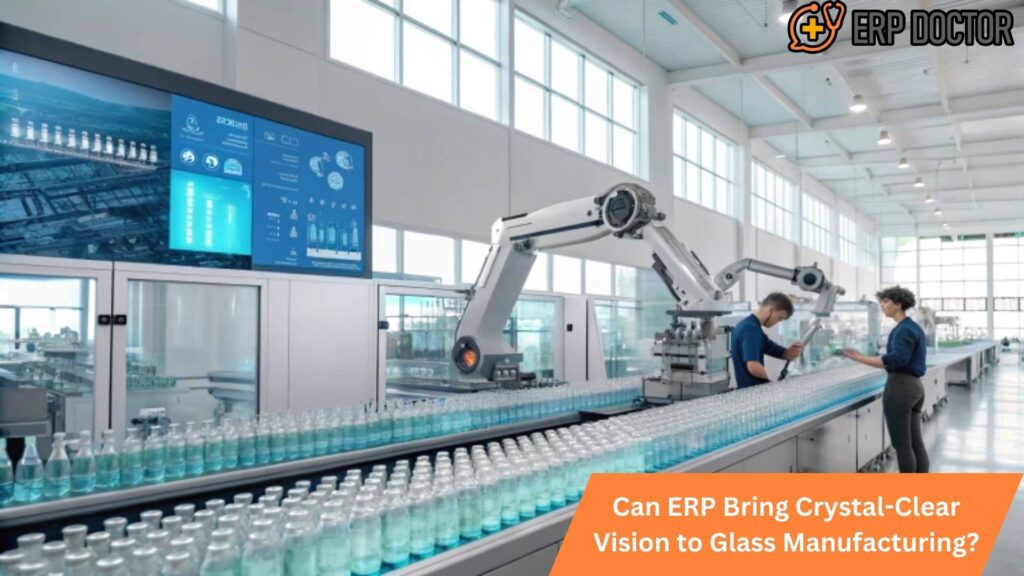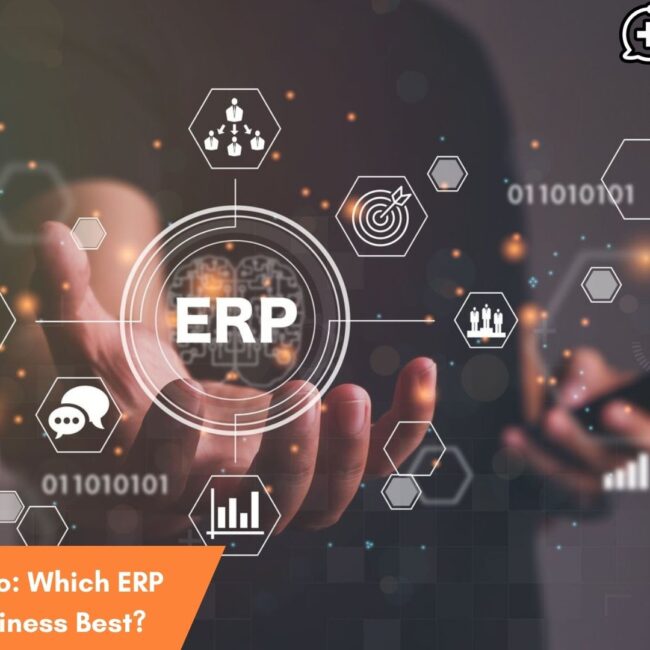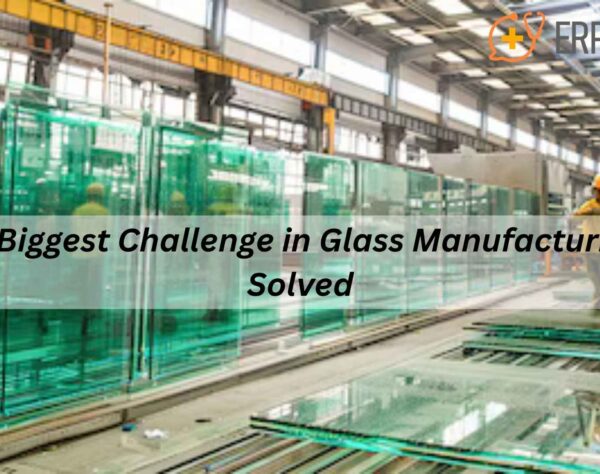
Can ERP Bring Crystal-Clear Vision to Glass Manufacturing?

Through the Looking Glass: How ERP Brings Clarity and Control to Glass Manufacturing
In the intricate world of Glass Manufacturing, one small crack in coordination can ripple into major production delays, quality issues, and financial losses. From sourcing raw materials to handling fragile deliveries, the industry runs on precision, timing, and tight integration. But in many plants, the process is anything but clear. Disconnected departments, outdated tools, and guesswork-based planning obscure visibility and dull efficiency.
Enter ERP—the enterprise solution that brings glass-level transparency to your operations. With the ability to connect every workflow, monitor real-time data, and anticipate needs before they become problems, ERP gives Glass Manufacturing companies the edge they need to thrive in a high-demand, high-precision world.
The Fragile Flow: Why Traditional Systems Shatter Under Pressure
Glass may be strong when finished—but its production process is fragile. Challenges like these are common:
- Inconsistent inventory tracking causes material shortages or overstocking
- Manual production planning leads to missed schedules
- Lack of real-time machine data causes costly breakdowns
- Inadequate QA processes increase defect rates
- Disconnected departments hinder visibility into performance
These fractures slow growth and drain resources. An integrated ERP system, however, offers a solid digital backbone to bring everything into focus.
The ERP Effect: Bringing Clarity to Every Layer of Glass Production
1. Crystal-Clear Inventory & Procurement
Raw materials like silica sand, soda ash, and dolomite must be carefully balanced. ERP automates:
- Real-time material monitoring across warehouses
- Vendor performance tracking and automated reordering
- Batch traceability for composition consistency
This minimizes waste, ensures compliance, and improves procurement cycles.
2. Precision-Controlled Production Planning
Glass production can’t afford delays. ERP enhances:
- Forecast-based production scheduling
- Machine uptime optimization with IoT sensors
- Load balancing across shifts or production lines
ERP acts like a conductor for your operations—synchronizing the rhythm of machines, materials, and manpower.
3. Quality Control that Reflects High Standards
From float glass to custom-designed decorative pieces, quality is non-negotiable. ERP empowers QA teams to:
- Set and track quality benchmarks per product line
- Automate inspections and corrective workflows
- Maintain audit trails for certifications and compliance
You don’t just catch defects—you prevent them.
4. Sales, CRM & Order Customization
Glass buyers often have specific needs—sizes, tints, treatments. ERP ensures:
- Custom product configurations linked to CRM and BOMs
- Quotation to delivery tracking for made-to-order projects
- Integrated service follow-up and client history access
Every customer interaction becomes tailored, trackable, and more profitable.
5. Logistics & Distribution Visibility
ERP doesn’t stop at the warehouse. It keeps logistics teams informed:
- Delivery tracking with GPS and carrier integration
- Dynamic route planning for fragile shipments
- Proof of delivery and real-time status updates
No more blind spots in fulfillment. Just transparent, traceable deliveries.
6. Financial Clarity and Profitability Analysis
From furnace fuel to labor to glass scrap recovery, costs need close control. ERP enables:
- Budget tracking by department or product line
- Real-time P&L statements
- Automated billing and payment reconciliation
Finance teams move from reactive accounting to proactive strategy.
Special Features That Make ERP a Perfect Fit for Glass Manufacturing
- Batch Formula Management: Create, store, and refine recipes based on glass type, thickness, and composition
- Multi-Stage Production Visibility: Track progress from melting to annealing to finishing
- Preventive Maintenance Tools: Use ERP to schedule maintenance before breakdowns occur
- Integrated Document Management: Store blueprints, safety records, and ISO certifications
- Compliance Dashboards: Monitor environmental, safety, and energy efficiency metrics in real time
Global Success Stories: Glass Companies Seeing the Light
- A custom architectural glass firm reduced design-to-delivery time by 45% after digitizing its workflows with ERP.
- A container glass plant cut raw material waste by 30% through real-time monitoring and inventory synchronization.
- A decorative glass manufacturer integrated sales, CRM, and production to increase customer retention by 40%.
Each case highlights how ERP transforms reactive operations into well-oiled, intelligent ecosystems.
The Competitive Edge of ERP in the Glass Industry
Modern buyers want faster delivery, tighter tolerances, and more sustainable sourcing. Meanwhile, plant managers need insights that are actionable—not hidden in spreadsheets. Here’s why ERP is not just helpful, but essential:
- Unified Data: Eliminate silos between production, sales, finance, and logistics
- Scalable Structure: Grow from one product line to global distribution without switching systems
- Industry Flexibility: Customize ERP workflows for tempered, laminated, or specialty glass
- Remote Accessibility: Manage operations from your phone, tablet, or laptop, anywhere
In short, ERP allows glass manufacturers to move at the speed of business—without losing clarity or control.
A Transparent Future Starts with ERP
Glass manufacturing is evolving, and the companies that adapt will shape the future of architecture, automotive, and technology. ERP gives you the control, insight, and agility to lead that future—not just survive it.
Whether you’re scaling operations, launching new lines, or reducing waste, ERP offers a transparent roadmap toward efficiency, profitability, and innovation.
So, can ERP bring crystal-clear vision to glass manufacturing? Absolutely—and then some.
FAQs
1. Can ERP help glass manufacturers manage seasonal demand shifts?
Yes, ERP systems use historical data to forecast demand and adjust production planning.
2. Does ERP support multi-product BOMs in custom glass manufacturing?
Absolutely. ERP can manage complex bills of materials with multiple treatments and customizations.
3. How can ERP improve furnace maintenance in glass plants?
ERP schedules preventive maintenance and logs sensor data to avoid unexpected downtimes.
4. Is ERP effective for glass recyclers and sustainability reporting?
Yes, ERP tracks recycled input, waste reduction, and emissions for ESG compliance.
5. Can ERP be used in real-time glass cutting and CNC operations?
Yes, ERP integrates with cutting machines and CNC software to automate production data.
6. How does ERP help improve accuracy in glass order deliveries?
ERP manages shipment planning, barcode scanning, and digital proof of delivery.
7. Is ERP suitable for decorative or small-scale glass manufacturers?
Definitely. ERP scales down easily and supports creative workflows like design approvals.
8. Can ERP connect with ecommerce for online glass orders?
Yes, many ERP systems integrate directly with ecommerce platforms for B2B or B2C orders.
9. How does ERP simplify export logistics in glass manufacturing?
ERP handles export documentation, customs compliance, and global shipment tracking.
10. Can ERP track energy consumption for sustainability goals?
Yes, ERP tracks energy usage, integrates with sensors, and helps meet sustainability targets.




